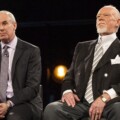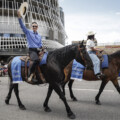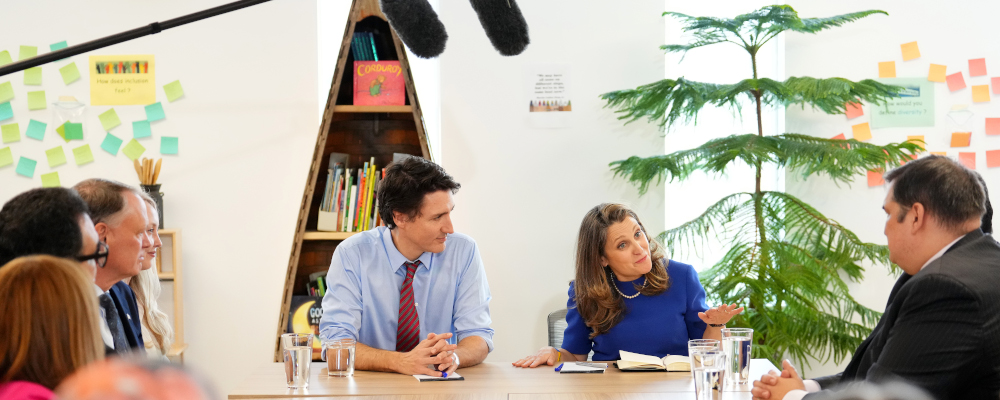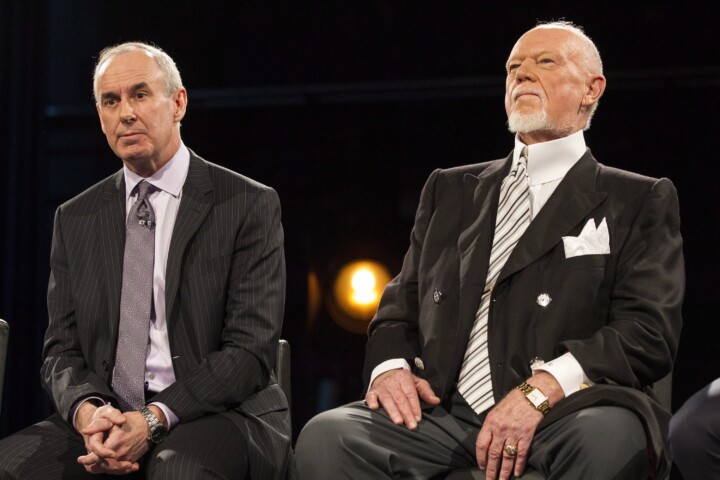This week marks The Hub’s second anniversary in publication. For our one-year anniversary, we published ten lessons that we had learned over The Hub’s initial twelve months. In light of this year’s sustained period of high inflation, we’ve opted for eleven lessons for The Hub’s Year Two.
- We learned that sometimes you have to be lucky to be good. Last week’s historic indictment of former U.S. President Donald Trump just happened to occur the day before a regularly scheduled recording of our bi-weekly video and podcast series with David Frum. We couldn’t have planned it better ourselves. It gave us a prime opportunity to get David’s informed perspective on this extraordinary development which he characterized as “a very large political moment.” The Hub community seemed to agree. As of this morning, the YouTube video of our conversation had 14,167 views which is our most ever.
- We learned a new definition of “fiscal restraint” from Finance Minister Chrystia Freeland and her recent federal budget. Apparently, it’s now defined as limiting new, incremental to a mere $40 billion. It makes us wonder how she’d define fiscal profligacy. We probably can’t afford to find out.
- More seriously, we learned that the past two federal elections and others across the country have been subjected to interference from interlocutors of the Chinese state. The immediate reaction to this explosive story has understandably focused on the political consequences for Prime Minister Justin Trudeau and his government. But as important as it is that we learn what and when the government knew about these allegations and why it failed to do anything about them, that itself won’t solve the fundamental problem. We urgently need a multi-partisan consensus in favour of fortifying our elections from these types of foreign threats. Some things must be bigger than partisanship.
- We learned that the case for “getting back to the office” as we argued in The Hub’s first and only unnamed editorial in September 2022 is far from universally held. We received unprecedented feedback and submissions in response to the editorial which we regularly published for several weeks in the aftermath. Reader reaction was probably, on balance, in favour of maintaining remote work and other flexible workplace arrangements though many seemed to distinguish between the public and private sectors. While we continue to believe that the costs and consequences of what we called “empty offices” are being underestimated by business leaders and policymakers, we were tremendously grateful for the honest, interesting, and respectful engagement from The Hub community on the subject. We intend to publish more reader reaction in Year Three.
- We were surprised to learn that there’s a decent-sized audience for The Hub’s Friday Roundtable podcast. We launched the weekly podcast with low expectations in February 2022. But it really took shape over the past twelve months and the response has been really positive. The podcast receives several thousand downloads each week. It must be Rudyard Griffiths’s dependable rants that keep listeners coming back for more. Thanks to The Hub community for your ongoing support.
- We learned that an extraordinary group of thinkers, writers, scholars, and even a few politicians is prepared to accept our invitation to join us as guests on The Hub’s twice-weekly podcast, Hub Dialogues. As the host, the past year was a huge thrill for me in particular because I had the chance to interview some of my favourite public intellectuals including Russ Roberts, Ross Douthat, Emily Oster, and Reihan Salam. We already have some great guests in store for Hub listeners in the next year of Hub Dialogues. Stay tuned.
- We learned about the massive worldwide decline of insects over the past few decades in one of our most unique and interesting episodes of Hub Dialogues with British entomologist Dave Goulson in October 2022. Even if I wasn’t entirely sold on his idea of extending “rights” to insects (though one wouldn’t be surprised if the Supreme Court of Canada may soon discover them in its latest activist decision), I was left convinced that what he calls the “insect apocalypse” is something that we ought to be concerned about as individuals and a society. Keep that in mind next time you have an impulse to step on a bug.
- We learned once again how lucky we are to have such a talented and diverse group of contributors. Notwithstanding our budget size relative to larger media outlets, we happen to think that our content pound-for-pound regularly exceeds what one can find elsewhere. That’s in no small part due to the brilliant mind of Howard Anglin, the first-class economic analysis of Trevor Tombe, Richard Shimooka’s expert commentary on defence and national security, the thoughtful legal analysis of Joanna Baron, and the dozens and dozens more who’ve helped to solidify The Hub as a leading source of content on ideas, policy, and politics.
- We learned Malcolm Jolley was up to the task to turn his previously bi-weekly wine column into a weekly one due to the overwhelming feedback from readers that we received in Year One. I know several friends regularly consult Malcolm’s non-pretentious advice each week before they head to the LCBO.
- We similarly learned that our poet-in-residence Jack Mitchell has a seemingly infinite capacity to bring his talents to bear on everything from the Queen’s passing to the start of the baseball season to life as a father. Jack’s daily contributions help to enliven and bring joy to The Hub’s daily newsletter Per Diem. Getting access to his epigram of the day itself far exceeds the cost of a regular subscription.
- Finally, we learned of the ongoing goodwill and support from the thousands of people whose financial support, subscriptions, and growing readership have given our little enterprise such energy and momentum as we enter its third year. The Hub has grown bigger and faster than we even envisioned. Thank you. We quite literally couldn’t do it without you. If you’d like to join The Hub community and support our mission, you can sign-up for our free weekly newsletter or donate here.
We look forward to what the coming year brings. If the past twelve months are a sign, it’s bound to be an interesting, thought-provoking, and even fun ride. We hope that you’ll continue to join us for it.
Recommended for You

Sean Speer: Maybe Ron MacLean is the one who needs to go

Falice Chin: A tale of two (Poilievre) ridings

Evan Menzies: Calgary at 150: Why is it so hard to celebrate our history?

‘We’re winning the battle of ideas’: Conservative MP Aaron Gunn on young men moving right, the fall of ‘wokeness,’ and the unraveling of Canadian identity




